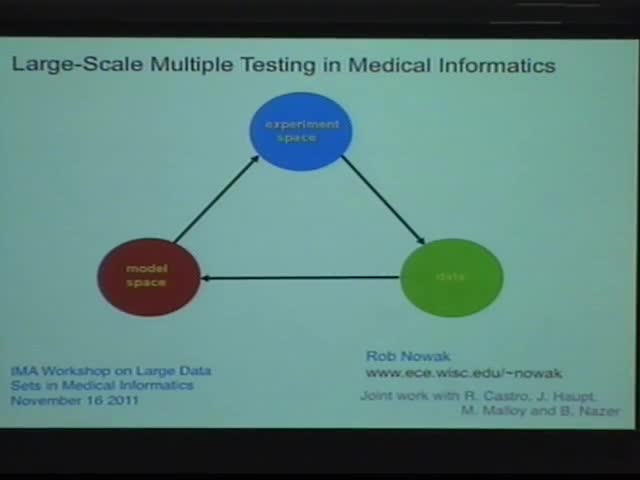Large-Scale Multiple Testing in Medical Informatics
Presenter
November 16, 2011
Keywords:
- Medical
MSC:
- 92C50
Abstract
In this talk I will discuss the novel experimental designs for
large-scale multiple hypothesis testing problems. Testing to determine
which genes are differentially expressed in a certain disease is a
classic instance of multiple testing in medical informatics. Tremendous
progress has been made in high-dimensional inference and testing
problems by exploiting intrinsic low-dimensional structure. Sparsity is
perhaps the simplest model for low-dimensional structure. It is based on
the assumption that the signal of interest can be represented as a
combination of a small number of elementary components. Sparse recovery
is the problem of determining which components are needed in the
representation based on measurements of the signal. For example,
diseases are often characterized by a relatively small number of genes,
which can be identified using high-throughput experimental techniques.
This talk focuses on two issues related to this line of research.
1. Most theory and methods for sparse recovery are based on non-adaptive
measurements. I will discuss the advantages of sequential measurement
schemes that adaptively focus sensing using information gathered
throughout the measurement process. In particular, I will show that
sequential testing procedures can be significantly more powerful than
non-sequential methods in the high-dimensional setting.
2. The standard sparse recovery problem involves inferring sparse linear
functions. I will discuss generalizations of the standard problem to the
recovery of sparse multilinear functions. Such functions are
characterized by multiplicative interactions between the input
variables, with sparsity meaning that relatively few of all conceivable
interactions are present. This problem is motivated by the study of
interactions between processes in complex networked systems (e.g., among
genes and proteins in living cells). Our results extend the notion of
compressed sensing from the linear sparsity model to nonlinear forms of
sparsity encountered in complex systems. In contrast to linear sparsity
models, in the multilinear case the pattern of sparsity can
significantly affect sensing requirements.
